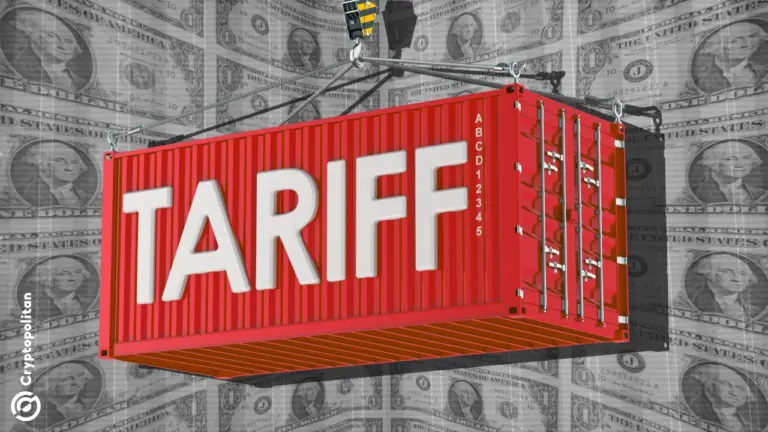USAID could follow Elon Musk-led DOGE unit's idea to adopt blockchain technology under Trump aides' proposal: report
Quick Take Trump administration officials have crafted a proposal to rebrand USAID and leverage blockchain technology as part of a more transparent procurement process, according to a document purportedly circulating the State Department. The proposal follows the Elon Musk-led DOGE unit, which recently recommended a slew of cuts to USAID, in exploring options for putting federal government systems onchain.

The under-fire U.S. Agency for International Development (USAID) could leverage blockchain technology to help track funds as part of a more transparent procurement process under a proposed overhaul and rebrand from Trump administration officials.
According to a document purportedly circulating in the U.S. State Department and obtained by Politico, a section of the proposal on creating "modernized, performance-based procurement" processes suggests "all distributions would be secured and traced via blockchain technology to radically increase security, transparency and traceability." However, it is not clear how exactly this would work and what type of blockchain technology would be used — be that a public, private or hybrid model.
"This approach would encourage innovation and efficiency among implementing partners and allow for more flexible and responsive programming focused on tangible impact rather than simply completing activities and inputs," the document adds.
USAID is the U.S. government agency responsible for administering foreign aid and development assistance around the world. Under recommendations from the Elon Musk-led government efficiency unit, DOGE, it is facing a slew of cuts — with critics, including President Trump, accusing USAID of wasteful spending, citing projects such as funding for diversity initiatives and tourism promotion abroad.
In response, the Trump administration initiated a substantial restructuring of U.S. foreign aid, aiming to align it more closely with national interests, which led to a temporary freeze on USAID funding and a reduction in its workforce. However, these actions faced legal challenges, with a federal judge issuing a preliminary injunction. Supporters of the agency stressed the importance of its humanitarian work, such as providing health care and disaster relief, arguing that budget cuts could destabilize global affairs and harm U.S. interests.
The proposal describes current U.S. aid and development programs as "inefficient and fragmented," criticizing them for attempting to engage "in every sector in every country" with questionable outcomes. A better approach would be to "foster peace and stability in regions critical to U.S. interests, catalyze economic opportunities that support American businesses and consumers, and mitigate global threats such as pandemic diseases," the document states, stressing that aid programs should have end dates with their success measured carefully.
Other proposals highlighted in the document include changing USAID's name to U.S. Agency for International Humanitarian Assistance (IHA), refining its focus to issues such as global health, food security and disaster response, embedding it within the State Department and moving virtually all "politically orientated" programs the Trump administration may wish to pursue under its purview, Politico reported , making it leaner, more focused and "better positioned to take on China."
It's unclear whether Secretary of State Marco Rubio or other senior Trump officials have approved the proposal, which does not constitute any concrete plans and acknowledges that some changes may require congressional approval.
The Block reached out to the State Department for comment.
Elon Musk's DOGE also considering blockchain adoption
A rebranded USAID's potential use of blockchain in its procurement process follows Elon Musk's DOGE in also considering the adoption of the technology.
In January, Elon Musk and DOGE representatives reportedly spoke with blockchain providers while exploring options for putting federal government systems onchain, according to a Bloomberg report, though no specific blockchain networks were mentioned.
Possible use cases include tracking federal spending, managing buildings and making payments, though talks are still in their early stages.
"All governments should track all their spending on the blockchain, an immutable public ledger," Binance founder Chengpeng Zhao said at the time. "It's called 'public spending' for a reason."
Disclaimer: The content of this article solely reflects the author's opinion and does not represent the platform in any capacity. This article is not intended to serve as a reference for making investment decisions.
You may also like
U.S. dollar stabilizes as investors anticipate possible Fed cuts
Share link:In this post: The U.S. dollar gained against major world currencies after its August 1 tumble, as investors looked forward to imminent Fed rate cuts. Trump’s firing of the Bureau of Labor Statistics Commissioner Erika McEntarfer and the surprise resignation of Fed Governor Adriana Kugler sank the dollar on Friday. MRB Partners warned of an even more “dire scenario” if faith in the U.S. government’s ability or willingness to repay its debts ever faltered.
Trump floats tariff dividend for middle and lower income Americans
Share link:In this post: President Donald Trump says they may offer some kind of dividend to Americans from the tariff revenue. In late July, Trump had said they were considering rebate checks for Americans. Countries still have up to August 7 to negotiate a trade deal with the US.

Ethena’s USDe expanded its supply by 75% in July to become the third-largest stablecoin
Share link:In this post: Ethena’s USDe expanded its supply by 75% in July, reflecting the ETH rally and the renewed confidence in the crypto market. Staked USDe rose to a record premium at $1.19, with $5.22B staked. USDe has spread to Bybit and Uniswap V3, with he potential to decrease the supply if ETH breaks its bullish streak.

Former UK Chancellor Osborne warns the UK is losing in global crypto race
Share link:In this post: Former UK Chancellor and British Finance Minister George Osborne warned that the country was losing crypto ground to rivals in the global race. Osborne criticized the Labour government for its cautious approach to crypto, pointing out that the U.S., the UAE, and Asia were seizing the opportunity. The founder of ByteTree, Charlie Morris, said the FCA had taken an understandable cautious approach given Bitcoin’s volatile past.

